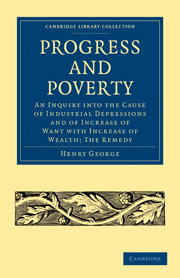 Progress and Poverty
Progress and Poverty Book contents
- Frontmatter
- PREFACE TO FOURTH EDITION
- Contents
- INTRODUCTORY
- BOOK I WAGES AND CAPITAL
- BOOK II POPULATION AND SUBSISTENCE
- BOOK III THE LAWS OF DISTRIBUTION
- BOOK IV EFFECT OF MATERIAL PROGRESS UPON THE DISTRIBUTION OF WEALTH
- Chapter I The dynamics of the problem yet to seek
- Chapter II Effect of increase of population upon the distribution of wealth
- Chapter III Effect of improvements in the arts upon the distribution of wealth
- Chapter IV Effect of the expectation raised by material progress
- BOOK V THE PROBLEM SOLVED
- BOOK VI THE REMEDY
- BOOK VII JUSTICE OF THE REMEDY
- BOOK VIII APPLICATION OF THE REMEDY
- BOOK IX EFFECTS OF THE REMEDY
- BOOK X THE LAW OF HUMAN PROGRESS
- CONCLUSION
- INDEX
Chapter I - The dynamics of the problem yet to seek
Published online by Cambridge University Press: 07 September 2011
- Frontmatter
- PREFACE TO FOURTH EDITION
- Contents
- INTRODUCTORY
- BOOK I WAGES AND CAPITAL
- BOOK II POPULATION AND SUBSISTENCE
- BOOK III THE LAWS OF DISTRIBUTION
- BOOK IV EFFECT OF MATERIAL PROGRESS UPON THE DISTRIBUTION OF WEALTH
- Chapter I The dynamics of the problem yet to seek
- Chapter II Effect of increase of population upon the distribution of wealth
- Chapter III Effect of improvements in the arts upon the distribution of wealth
- Chapter IV Effect of the expectation raised by material progress
- BOOK V THE PROBLEM SOLVED
- BOOK VI THE REMEDY
- BOOK VII JUSTICE OF THE REMEDY
- BOOK VIII APPLICATION OF THE REMEDY
- BOOK IX EFFECTS OF THE REMEDY
- BOOK X THE LAW OF HUMAN PROGRESS
- CONCLUSION
- INDEX
Summary
In identifying rent as the receiver of the increased production which material progress gives, but which labor fails to obtain; in seeing that the antagonism of interests is not between labor and capital, as is popularly believed, but is in reality between labor and capital on the one side and land ownership on the other, we have reached a conclusion that has most important practical bearings. But it is not worth while to dwell on them now, for we have not yet fully solved the problem which was at the outset proposed. To say that wages remain low because rent advances, is like saying that a steamboat moves because its wheels turn around. The further question is, what causes rent to advance? What is the force or necessity that, as productive power increases, distributes a greater and greater proportion of the produce as rent?
The only cause pointed out by Ricardo as advancing rent is the increase of population, which by requiring larger supplies of food necessitates the extension of cultivation to inferior lands, or to points of inferior production on the same lands, and in current works of other authors attention is so exclusively directed to the extention of production from superior to inferior lands as the cause of advancing rents that Mr. Carey (followed by Professor Perry and others) has imagined that he has overthrown the Ricardian theory of rent by denying that the progress of agriculture is from better to worse lands.
- Type
- Chapter
- Information
- Progress and PovertyAn Inquiry into the Cause of Industrial Depressions and of Increase of Want with Increase of Wealth; The Remedy, pp. 205 - 206Publisher: Cambridge University PressPrint publication year: 2009First published in: 1881


